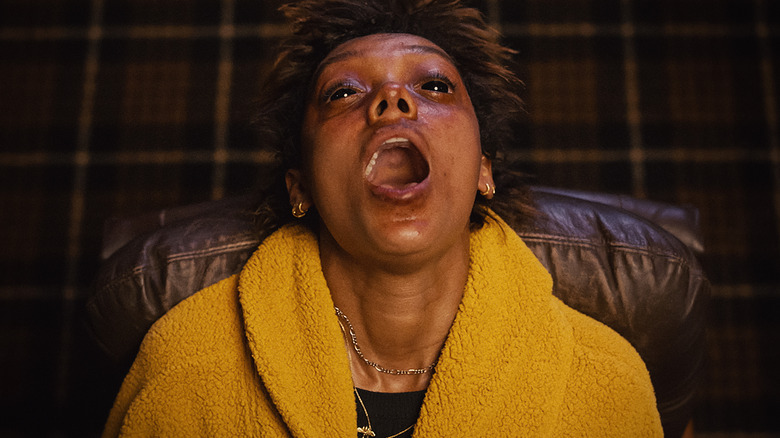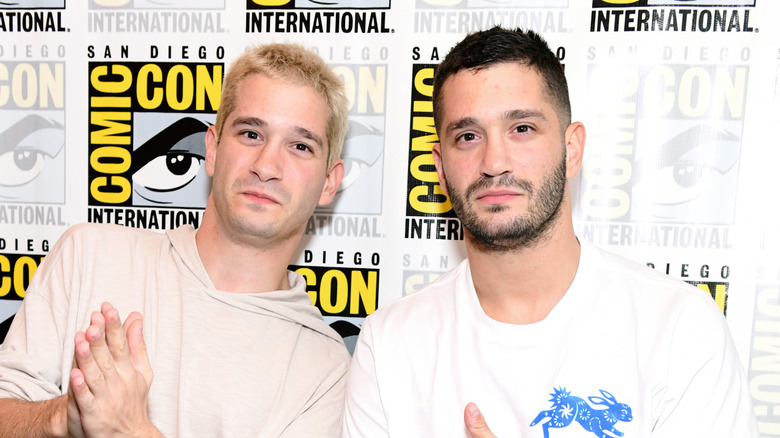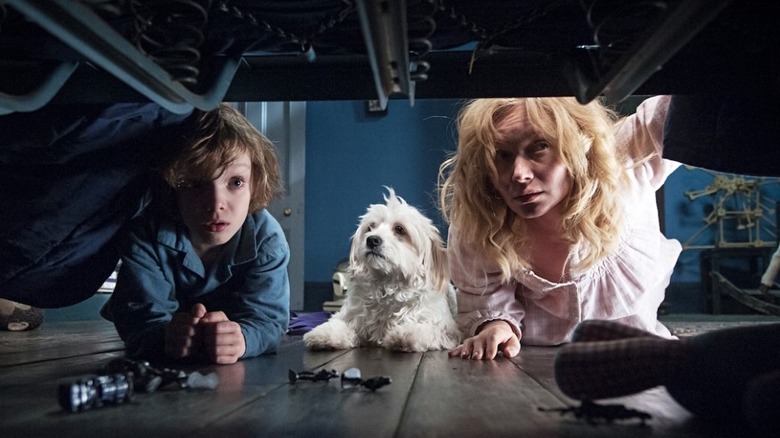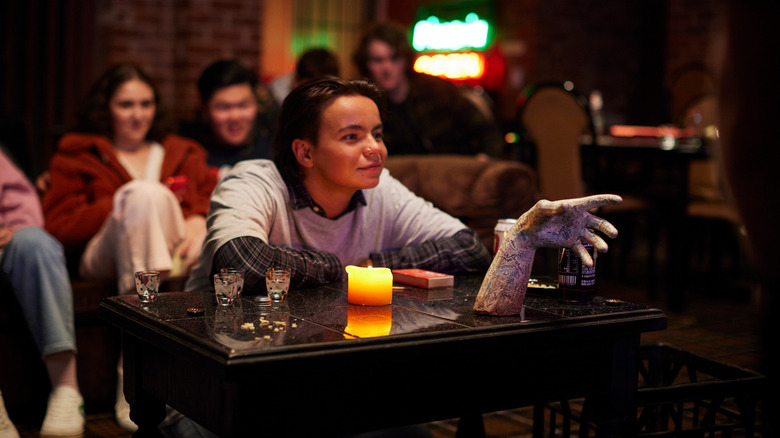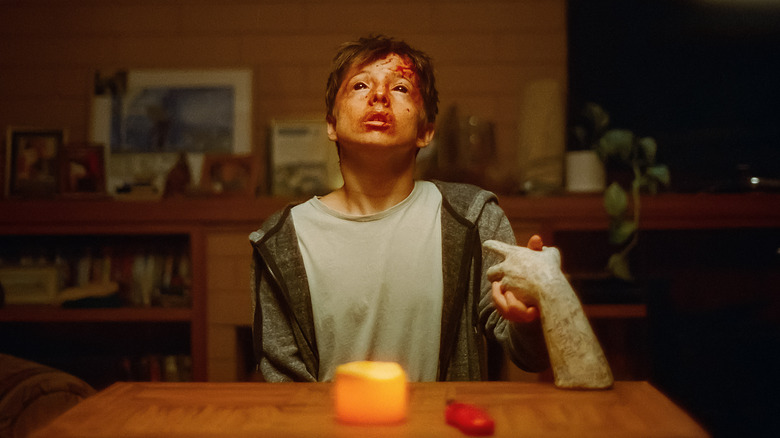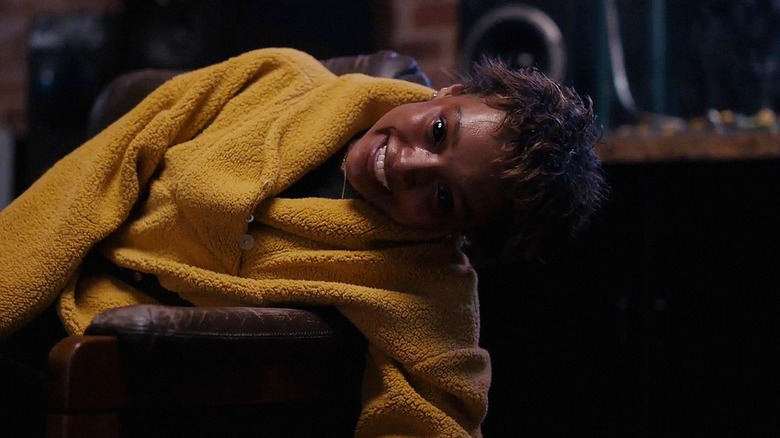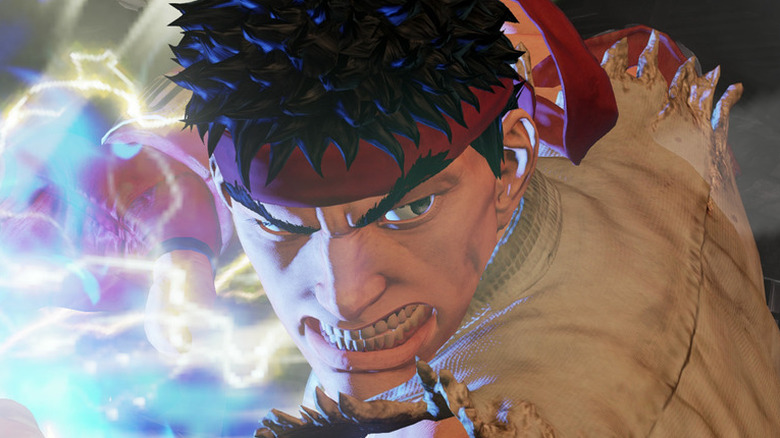Talk To Me's Danny And Michael Philippou Used YouTube As A Practice Ground For First Feature - Exclusive Interview
In "Talk to Me," the feature directorial debut from brothers and YouTube creators Danny and Michael Philippou, a group of teenage friends in an Australian suburb become part of a viral incursion into the occult that seems at first both creepy and exhilarating: they come into possession of the mummified hand of a dead psychic which opens a portal to the spirit realm when you clasp it.
Say "talk to me" and a spirit enters your body and begins speaking through you, while you experience what it's like on the other side. The connection has to be broken after 90 seconds; otherwise, the spirit will refuse to leave. Into this experiment comes a young woman named Mia (Sophie Wilde), who is still grieving the death of her mother and looking for any escape from daily reality. The hand could prove to be just that, but it's not long before her tampering with the spirit world goes horrifically wrong.
Before making the leap into the world of feature filmmaking, the Philippous — natives of Australia and very much familiar with the setting and the characters in their movie — spent the better part of a decade creating videos for their own YouTube channel, RackaRacka, piling up 6.7 million subscribers as they turned out increasingly elaborate clips of horror, comedy, action, and more.
With "Talk to Me" looking like another breakout horror sensation for studio A24, the Philippous are potentially tackling a live-action adaptation of the "Street Fighter" video game next. For now, the twins hope to maintain their own slightly anarchic filmmaking style even in the Hollywood system. "There is a certain way that we work that isn't traditional," Michael tells Looper in our exclusive interview. "There's a method to the madness and beauty in the chaos that you can capture."
From YouTube to an acclaimed horror feature
This is your first feature film and before this you were doing shorts on your YouTube channel. Did everything lead up to this? Was the endgame, so to speak, a feature film?
Danny: Well, yeah. This was all — YouTube was a practice ground for us as filmmakers, and we used every video that we did to sharpen our skills and learn something new and try a stunt for the first time, or try a certain [visual] effect, or try a certain makeup effect. Each of those videos was building up to finally taking that leap and doing the feature film.
Michael: We were doing short films and working on film crews before YouTube. YouTube, we fell into, and then we went, "What if we put effort into this and we can use it to experiment with certain ideas?" We've got a lot of the short film ideas and techniques. Now, with story and stuff, we're excited to take a leap and have a go at the more narrative-driven stuff.
What else changed for you in the way you worked as you went into your first feature?
Danny: I knew I wanted to make something that existed outside of our YouTube channel. Our YouTube channel was never a place that I could express myself, personally. I knew that the film — I wanted to focus on those characters in that story and make sure that we had a script that we felt confident in, because once you go into production for something that big, you get lost a little bit, and you have to always refer back to that blueprint that you've got to ground you and let you know where you are and where you are at the story and where the characters are emotionally. The script was a very big part of the process and it took us years to perfect it and make sure that we were comfortable with moving forward.
Michael: [It's the same thing] with character and having the emotional journey make sense with the actors. Each day, you can get lost when you're shooting so much, [losing track of] certain character beats and things, making sure they hit, because there's so much going on. It's tying it to the characters in the script. With YouTube, your character can do whatever and change suddenly. We'd have them become a completely different person, but that's funny on YouTube where it doesn't really matter, whereas with a story it does, and that sticks out. It's always bringing it back to the script and the story.
Why working on a horror classic was so inspiring
Back in 2014, both of you worked as crew members on "The Babadook," which is not only a horror classic, but arguably an Australian classic at this point. What did you learn from watching director Jennifer Kent, in terms of both horror and filmmaking?
Danny: It was the first set that I was on where the director really cared about what she was making. Jen wasn't there for a paycheck, she was there to create art, and I felt that presence, that dedication and that passion through every single day of the shoot. She wouldn't let outside forces dilute her vision. She always stuck by it, and I really admired that about her and that passion. I knew on set, "This movie can't end up bad because she cares so much."
That is something that we're really inspired by and have, I guess, on our set. Everything that we make, we put 100% of ourselves into it, so it can be the best. If there's anything that can make it 1% better, go that extra mile to do that, and that's like seeing Jen work.
The origins of Talk to Me
The idea for "Talk to Me" initially came from a friend of yours named Daley Pearson. How did the idea develop about the hand and the kids getting involved with it?
Danny: I knew there was a story of these neighbors that we watched [while] growing up. There were three boys. One of them was trying drugs out for the first time, and he was having a negative reaction to the drug he'd taken, and he was on the floor, convulsing. The kids he was with were filming him and laughing at him and no one was helping him. I remember that footage sticking with me and bothering me.
Daley had sent me a short film about these kids that were having fun with possessions. It was a comedy horror thing. I did a rewrite of that script and I inserted characters that I was connecting with. Once I started writing, I couldn't stop, and within [about] eight days, I had 80 pages that I sent over to my co-writer, Bill Hinzman.
It wasn't until the second draft of the full film that we found the hand. Physical touch and human connection were such a prominent feature in the first draft of the script. It was such a motif, such a recurring element that it felt right to be our object of horror. It physically represents everything that we're talking about, thematically and subtextually, in the first draft. That's where it came from. When writing, I was tapping into anything that was scaring me at the time, whether it be mental illness, or loneliness, or any of that stuff. It's expressing that on the page.
Making a horror movie about young people feel real
Based on how you came up, working on YouTube, having things going viral, and also being relatively young men, do you feel you have a better handle on the way things can go viral and spread among a community of young people?
Danny: Yeah, we knew that when we were writing it, we wanted it to be current, and the way they use social media felt natural to us. We wrote it in ... not trying to make a comment on things necessarily, but it felt real to the world that we knew and we grew up in and that young people are living in today. It was about putting that on there and making it feel real. Before pre-production started, we were trying to get the rights to things like Snapchat and to make sure that when social media is portrayed, it feels authentic and real. It doesn't feel like a fake app or a Hollywood spin on social media. We wanted it to feel real.
Michael: With going viral, we know YouTubers and understand that and they know what to do to get certain engagement. Our videos, at the time, stuck out because no one was really doing cinematic fight sequences, things like that. We were just one of the first ones doing that. We got attention that way, but there's people that really chase and understand the algorithm of what to do to get this or that reaction.
Danny: We know that people do more and more extreme things for attention.
Michael: If that hand was with a bunch of kids, that's exactly what would be happening.
Danny: If you look up a #possession or #OuijaBoard online, you'll find thousands of videos of kids trying to make things happen or obsessed things happening. There's an obsession with the paranormal.
The Philippous list their horror and genre favorites
What are the benchmark genre movies for you that you grew up with that either influenced you, or scarred you for life?
Danny: We love "The Exorcist." It's the granddaddy of all possession films.
Michael: [The 2003 remake of] "Texas Chainsaw Massacre" when I was a little kid. First time I ran out of a cinema when I was like 13. That was–
Danny: 13, no, you were 11.
Michael: 11, okay, I was 11. That scarred me.
Danny: "Let the Right One In" is a really good [film], because that felt really grounded and rooted in character, which I find really strong.
Michael: "Shaun of the Dead," [is a] nice comedy-horror.
Danny: Sam Raimi, he's a king as well. Bong Joon-Ho — it's not a horror film, but "Memories of Murder" is an awesome example of blending different genres and tones and still making it feel like one piece. I also love "The Vanishing." They're probably the main things I can think of right now.
Making Street Fighter their way
"Talk to Me" was a breakout hit at Sundance earlier this year and put you on the Hollywood radar. Are you guys doing "Street Fighter" next?
Danny: Yeah, we're attached to it at the moment, and we're developing it. Well, we're not developing this second, there's a strike going on.
Michael: We are attached to developing it. The idea of getting a studio budget to bring to life a game that we love and the lore that we love and characters that we loved playing growing up, in our style, with our action sequences would be very exciting.
Danny: We know we can do something that's never been done before, because even on the YouTube budget, we were designing stunt rigs that hadn't been made before. The idea of doing that on a Hollywood level, with a big studio budget, it's very exciting.
Michael: Give us a budget and get out of our way.
As you move on and have more success, do you want to maintain your working style, which we imagine has been very hands-on, but yet have the big budget and have the resources to do this stuff?
Danny: Yeah. We know that we're really comfortable, if we ever did another film with A24, that they are filmmaker-friendly and filmmaker-first. They're not going to sit there and try and change anyone's vision or get too — they won't come in and try and shift things. We're comfortable making any film with A24. In terms of another studio, it's all going to be in those conversations that they iron it out, before we jump into something, to know that we're going to be given the freedom that we need to do our thing, because otherwise, it won't be ours, and it'll turn generic.
Michael: There is a certain way that we work that isn't traditional. Everyone that was on the set of "Talk to Me" was like, "This is not how a film set normally runs." There's a method to the madness and beauty in the chaos that you can capture. It's a different style of working. Working with the companies and the people that are okay with that, and the performers as well that are open to that — that's the kind of people that you want to work with.
"Talk to Me" opens in theaters on Friday, July 28.
This interview has been edited for clarity.
